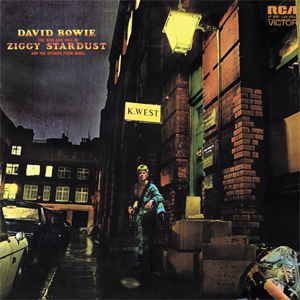
The Rise and Fall of Ziggy Stardust and the Spiders from Mars is the fifth studio album by the English musician David Bowie, released on 16 June 1972 in the United Kingdom through RCA Records. It was co-produced by Bowie and Ken Scott and features Bowie's backing band the Spiders from Mars — Mick Ronson, Trevor Bolder and Mick Woodmansey. It was recorded from November 1971 to February 1972 at Trident Studios in London.
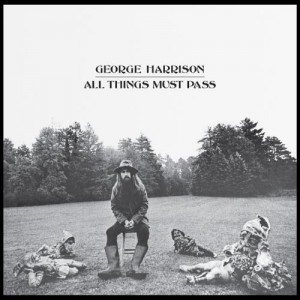
All Things Must Pass is the third studio album by English rock musician George Harrison. Released as a triple album in November 1970, it was Harrison's first solo work after the break-up of the Beatles in April that year. It includes the hit singles "My Sweet Lord" and "What Is Life", as well as songs such as "Isn't It a Pity" and the title track that had been overlooked for inclusion on releases by the Beatles. The album reflects the influence of Harrison's musical activities with artists such as Bob Dylan, the Band, Delaney & Bonnie and Friends and Billy Preston during 1968–70, and his growth as an artist beyond his supporting role to former bandmates John Lennon and Paul McCartney. All Things Must Pass introduced Harrison's signature slide guitar sound and the spiritual themes present throughout his subsequent solo work. The original vinyl release consisted of two LPs of songs and a third disc of informal jams titled Apple Jam. Several commentators interpret Barry Feinstein's album cover photo, showing Harrison surrounded by four garden gnomes, as a statement on his independence from the Beatles.
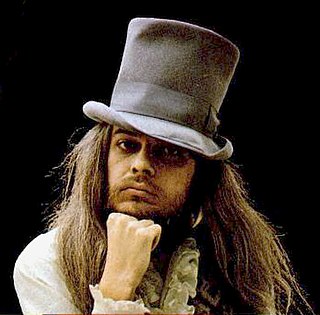
Leon Russell was an American musician and songwriter who was involved with numerous bestselling records during his 60-year career that spanned multiple genres, including rock and roll, country, gospel, bluegrass, rhythm and blues, southern rock, blues rock, folk, surf and the Tulsa sound. His recordings earned six gold records and he received two Grammy Awards from seven nominations. In 2011, he was inducted into both the Rock and Roll Hall of Fame and the Songwriters Hall of Fame.
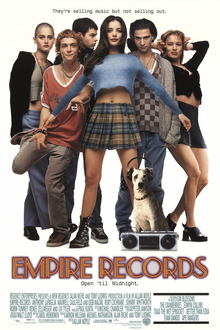
Empire Records is a 1995 American coming-of-age comedy-drama film directed by Allan Moyle, starring Anthony LaPaglia, Maxwell Caulfield, Debi Mazar, Rory Cochrane, Johnny Whitworth, Robin Tunney, Renée Zellweger, and Liv Tyler. The film follows a group of record store employees over the course of one exceptional day. The employees try to stop the store from being sold to a large chain, and learn about each other along the way. The film generated negative reviews and major losses at the domestic US box office at its release. It went on to become a cult hit, and several of its stars launched successful careers.

Thirty Three & 1⁄3 is the seventh studio album by English musician George Harrison, released in November 1976. It was Harrison's first album release on his Dark Horse record label, the worldwide distribution for which changed from A&M Records to Warner Bros. as a result of his late delivery of the album's master tapes. Among other misfortunes affecting its creation, Harrison suffered hepatitis midway through recording, and the copyright infringement suit regarding his 1970–71 hit song "My Sweet Lord" was decided in favour of the plaintiff, Bright Tunes Music. The album contains the US top 30 singles "This Song" – Harrison's satire on that lawsuit and the notion of plagiarism in pop music – and "Crackerbox Palace". Despite the problems associated with the album, many music critics recognised Thirty Three & 1⁄3 as a return to form for Harrison after his poorly received work during 1974–75, and considered it his strongest collection of songs since 1970's acclaimed All Things Must Pass.
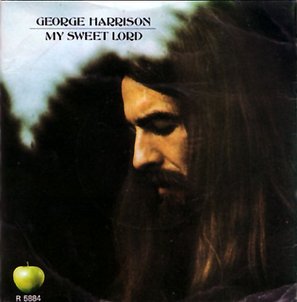
"My Sweet Lord" is a song by English musician George Harrison, released in November 1970 on his triple album All Things Must Pass. It was also released as a single, Harrison's first as a solo artist, and topped charts worldwide; it was the biggest-selling single of 1971 in the UK. In America and Britain, the song was the first number-one single by an ex-Beatle. Harrison originally gave the song to his fellow Apple Records artist Billy Preston to record; this version, which Harrison co-produced, appeared on Preston's Encouraging Words album in September 1970.

Colin Lewes Hanks is an American actor. He has starred in films including Orange County, King Kong, The House Bunny, The Great Buck Howard, and the Jumanji film series. His television credits include Roswell, Band of Brothers, Mad Men, Dexter, Fargo, The Good Guys, Life in Pieces, Impeachment: American Crime Story, The Offer, and A Friend of the Family. Hanks also provided the voice of Talking Tom, the title character in the web series Talking Tom & Friends. He is the eldest son of actor Tom Hanks.
Tower Records is an international retail franchise and online music store that was formerly based in Sacramento, California, United States. From 1960 until 2006, Tower operated retail stores in the United States, which closed when Tower Records filed for bankruptcy and liquidation. Tower Records was purchased by a separate entity and was not affected by the retail store closings.

"All Things Must Pass" is a song by English rock musician George Harrison, issued in November 1970 as the title track to his triple album of the same name. Billy Preston released the song originally – as "All Things (Must) Pass" – on his Apple Records album Encouraging Words (1970) after the Beatles had rehearsed the song in January 1969 but did not include it on their Let It Be album. The composition reflects the influence of the Band's sound and communal music-making on Harrison, after he had spent time with the group in Woodstock, New York, in late 1968. In his lyrics, Harrison drew inspiration from Timothy Leary's poem "All Things Pass", a psychedelic adaptation of the Tao Te Ching.

The Concert for Bangladesh is a live triple album credited to "George Harrison & Friends" and released on Apple Records in December 1971 in America and January 1972 in Britain. The album followed the two concerts of the same name, held on 1 August 1971 at New York's Madison Square Garden, featuring Harrison, Bob Dylan, Ravi Shankar, Ali Akbar Khan, Ringo Starr, Billy Preston, Leon Russell and Eric Clapton. The shows were a pioneering charity event, in aid of the homeless Bengali refugees of the Bangladesh Liberation War, and set the model for future multi-artist rock benefits such as Live Aid (1985) and the Concert for New York City (2001). The event brought Harrison and Starr together on a concert stage for the first time since 1966, when the Beatles retired from live performance, and represented Dylan's first major concert appearance in the US in five years.

"What Is Life" is a song by English rock musician George Harrison from his 1970 triple album All Things Must Pass. In many countries, it was issued as the second single from the album, in February 1971, becoming a top-ten hit in the United States, Canada and elsewhere, and topping singles charts in Australia and Switzerland. In the United Kingdom, "What Is Life" appeared as the B-side to "My Sweet Lord", which was the best-selling single there of 1971. Harrison's backing musicians on the song include Eric Clapton and the entire Delaney & Bonnie and Friends band, with whom he had toured during the final months of the Beatles. Harrison co-produced the recording with Phil Spector, whose Wall of Sound production also employed a prominent string arrangement by John Barham and multiple acoustic rhythm guitars, played by Harrison's fellow Apple Records signings Badfinger.
"Beware of Darkness" is a song by English rock musician George Harrison from his 1970 triple album All Things Must Pass. It is the opening track on the second disc of the album. The lyrics warn against allowing illusion to get in the way of one's true purpose in life, an admonition that, like the content of "My Sweet Lord", reflects the influence of Harrison's association with the Radha Krishna Temple. Several critics recognise the song as one of the best tracks on All Things Must Pass.
Insound was a discounted, online music store. Insound carried CD, vinyl, hard to find items, music accessories and merchandise. The company was located in New York, New York.

"Isn't It a Pity" is a song by English rock musician George Harrison from his 1970 solo album All Things Must Pass. It appears in two variations there: one the well-known, seven-minute version; the other a reprise, titled "Isn't It a Pity (Version Two)". Harrison wrote the song in 1966, but it was rejected for inclusion on releases by the Beatles. In many countries around the world, the song was also issued on a double A-side single with "My Sweet Lord". In America, Billboard magazine listed it with "My Sweet Lord" when the single topped the Hot 100 chart, while in Canada, "Isn't It a Pity" reached number 1 as the preferred side.

Ride, Rise, Roar is a documentary film chronicling the Songs of David Byrne and Brian Eno Tour conducted by David Byrne in 2008–2009. The film includes concert footage, footage of the planning and rehearsals for the tour, and exclusive interviews with Byrne, Eno, and the supporting musicians and dancers.
"Hear Me Lord" is a song by English rock musician George Harrison from his 1970 triple album All Things Must Pass. It was the last track on side four of the original LP format and is generally viewed as the closing song on the album, disc three being the largely instrumental Apple Jam. Harrison wrote "Hear Me Lord" in January 1969 while still a member of the Beatles, who rehearsed it briefly at Twickenham Film Studios that month, but passed it over for inclusion on what became their final album, Let It Be.
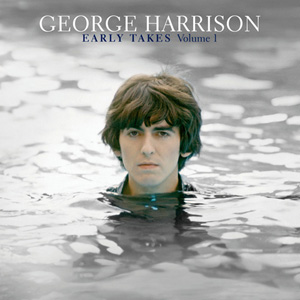
Early Takes: Volume 1 is a compilation album of outtakes and demo recordings by English rock musician George Harrison, released posthumously on 1 May 2012. The recordings appeared in Martin Scorsese's 2011 documentary film George Harrison: Living in the Material World and were originally issued as part of the deluxe version of the DVD release. Producer Giles Martin compiled the album, working with engineer Paul Hicks. The majority of the tracks date from the sessions for Harrison's 1970 triple album All Things Must Pass.
All Things Must Pass is a 1970 album by George Harrison.

Apple Jam is the third LP included in English rock musician George Harrison's 1970 triple album All Things Must Pass. It consists of four instrumental jams, three of which were recorded during the album sessions, and "It's Johnny's Birthday", a 30th birthday tribute to John Lennon. The disc was Apple Records' way of placating record buyers for the high retail price of All Things Must Pass, which was one of the first triple albums in rock history. It was given a dedicated design by Tom Wilkes, with a logo depicting a jam jar and apple leaves.
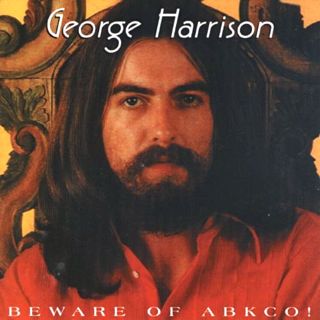
Beware of ABKCO! is a bootleg album of songs performed by English rock musician George Harrison in May 1970. It contains songs that were under consideration for Harrison's triple album All Things Must Pass, his first release as a solo artist following the break-up of the Beatles. The performances were taped in a single session at Abbey Road Studios in London, on 27 May 1970, for the benefit of Harrison's co-producer, Phil Spector. Seven of the fifteen songs were subsequently recorded formally for inclusion on All Things Must Pass, as was "Everybody, Nobody" after Harrison reworked it as "Ballad of Sir Frankie Crisp ". From its 1994 release by Strawberry Records, the bootleg provided the only available record of five songs that Harrison never revisited during his career. Among these is a 1968 collaboration with Bob Dylan titled "Nowhere to Go". All fifteen songs were officially released in August 2021, as part of the Uber and Super deluxe editions of the All Things Must Pass: 50th Anniversary box set.














